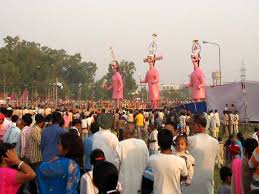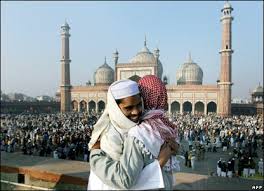 It is indeed the time of the year when Indians try to reconnect with their families, travel long distances to congregate at their homes, pray and fast together, perform rituals, wear new clothes, hug each other and rejoice and try to keep their traditions and faiths alive. The food is rich, roads are crowded, and offices and businesses crawl but the air seems charged with a renewed excitement. If sceptics and cynics find it amusing to see members of a family geting together to fast, eat, pray and celebrate togetheras meaningless old fashioned ritualds, the laugh may be on them!
It is indeed the time of the year when Indians try to reconnect with their families, travel long distances to congregate at their homes, pray and fast together, perform rituals, wear new clothes, hug each other and rejoice and try to keep their traditions and faiths alive. The food is rich, roads are crowded, and offices and businesses crawl but the air seems charged with a renewed excitement. If sceptics and cynics find it amusing to see members of a family geting together to fast, eat, pray and celebrate togetheras meaningless old fashioned ritualds, the laugh may be on them! It's not just lifestyle, human emotions too have a significant impact on an individual's well being, says a new study. Researchers from University of Kansas have found that positive emotions are critical for upkeep of physical health for people worldwide, especially for those who are deeply impoverished.
It's not just lifestyle, human emotions too have a significant impact on an individual's well being, says a new study. Researchers from University of Kansas have found that positive emotions are critical for upkeep of physical health for people worldwide, especially for those who are deeply impoverished.
"We've known for a while now that emotions play a critical role in physical health," said Sarah Pressman, assistant professor of psychology at KU and a Gallup senior research associate. "But until recently, most of this research was conducted only in industrialized countries. So we couldn't know whether feelings like happiness or sadness matter to the health of people who have more pressing concerns - like getting enough to eat or finding shelter. But now we do," she added.
During the study, the researchers analyzed the data from the Gallup World Poll involving more than 150,000 adults. The participants reported their emotions, and also answered questions about whether their most basic needs like food, shelter and personal safety were adequately met.
It showed that positive emotions such as happiness, enjoyment were unmistakably linked to better health, even when taking into account a lack of basic needs. While negative emotions such as worry and sadness were a reliable predictor of worse health.The association between emotion and physical health was more powerful than the connection between health and basic human physical requirements. Even without shelter or food, positive emotions were shown to boost health. Another study affirmed that family rituals (such as birthdays, religious celebrations, and family reunions) are associated with marital satisfaction, adolescents' sense of personal identity, academic achievement, children's health, and stronger family relationships.Barbara H. Fiese, Ph.D., and colleagues at Syracuse University studied family rituals, , involve symbolic communication and convey 'this is who we are' as a group and provide continuity in meaning across generations." according to Dr. Fiese. "Also, there is often an emotional imprint where once the act is completed, the individual may replay it in memory to recapture some of the positive experience." Routines can become rituals if they move from instrumental to a symbolic acts.
Another study affirmed that family rituals (such as birthdays, religious celebrations, and family reunions) are associated with marital satisfaction, adolescents' sense of personal identity, academic achievement, children's health, and stronger family relationships.Barbara H. Fiese, Ph.D., and colleagues at Syracuse University studied family rituals, , involve symbolic communication and convey 'this is who we are' as a group and provide continuity in meaning across generations." according to Dr. Fiese. "Also, there is often an emotional imprint where once the act is completed, the individual may replay it in memory to recapture some of the positive experience." Routines can become rituals if they move from instrumental to a symbolic acts.Be it Eid, Navratri or Durga Puja, celebrate it with emotional gusto. Never mind what the Westerners would say about our seemingly meaningless ceremonies. They probably envy us for them and for the fact that we remain ahead of them on the Happiness Index. What else is life all about?
As published in HT City ( Hindustan Times) dated 27 september , 2009.
No comments:
Post a Comment